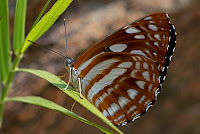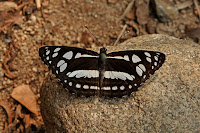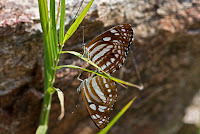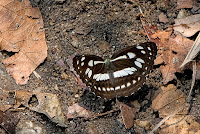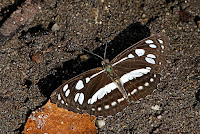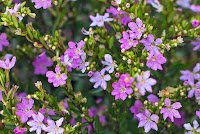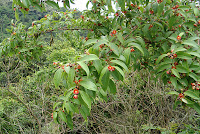<> Phaedyma columella (Cramer,1780) <>
the Short-banded Sailer ผีเสื้อกะลาสีเทาแถบสั้น
Click on any photo to see larger version
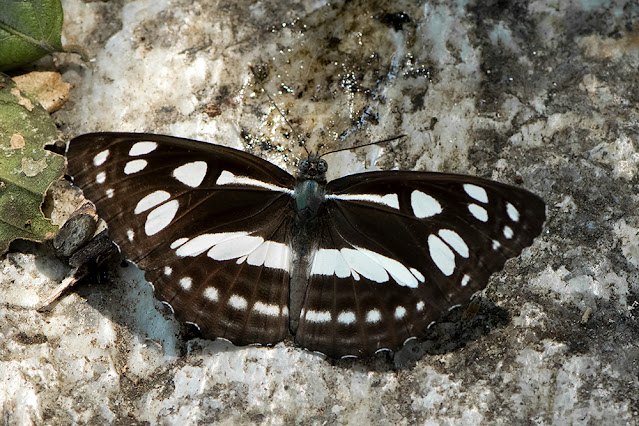
Photo taken at Doi Suthep-Pui National Park, Chiang Mai, Thailand. 460m a.s.l.

Widely distributed and common across the whole of the region except Taiwan. This species is visually similar to the Neptis genus but is larger. Male and female look alike but the species is variable, especially in relation to the seasons. Multivoltine with several broods per annum. Usually found near rivers and streams.
Synonyms and previously used names: Neptis columella, Neptis tonkiniana
Taxonomy: Animalia - Arthropoda - Insecta - Lepidoptera - Nymphalidae - Limenitidinae - Phaedyma - columella
Regional Distribution: India, Nepal, Bhutan, Bangladesh, Myanmar, Thailand, Laos, Cambodia, Vietnam, China, Malaysia, Singapore, Indonesia, Philippines
Habitat: evergreen and deciduous forest margins, up to 1500m a.s.l. Wingspan: 55-65mm
Flight time: all year, depending on location
Life History: egg 3-4 days instar 1 4 days instar 2 3-4 days instar 3 3-4 days instar 4 5-7 days instar 5 8-9 days pupa 6-7 days Total egg to adult 32-39 days. All times approximate.
Larval Hosts: Gmelina arborea (Lamiaceae), Cratoxylum cochinchinense (Hypericaceae), Dalbergia spp., Grona reticulata, Pterocarpus indicus, Pueraria tuberosa, Tadehagi triquetrum (Fabaceae), Ceiba speciosa, Hibiscus mutabilis, Reevesia pubescens, Reevesia thyrsoidea, Sterculia foetida, Sterculia lanceolata, Sterculia urens, Hibiscus tiliaceus (Malvaceae), Sageretia thea (Rhamnaceae), Erythroxylum cuneatum (Erythroxylaceae). Hosts used depends upon location and availability of plant species.
Adult Food Sources: Nectar - Cuphea hyssopifolia (Lythraceae), Ichnocarpus frutescens (Apocynaceae), Euphorbia hypericifolia (Euphorbiaceae), Ixora sp. (Rubiaceae), Zanthoxylum avicennae (Rutaceae), Leea alata (Vitaceae). There may be other nectar sources that have not been recorded. Other - mud puddling
Links to other pages in this series for species in the same subfamily
Athyma perius
Auzakia danava
Euthalia alpheda
Euthalia lubentina
Lasippa viraja
Limenitis asura
Neptis cartica
Neptis miah
Pantoporia hordonia
Sumalia daraxa
Athyma pravara
Bhagadatta austenia
Euthalia anosia
Euthalia monina
Lebadea martha
Limenitis dudu
Neptis clinia
Neptis nashona
Pantoporia paraka
Sumalia zulema

